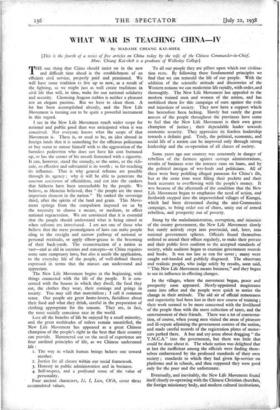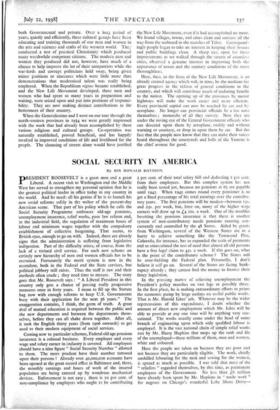WHAT WAR. IS TEACHING CHINA IV
Hy MADAME CHIANG KAI-SHEK
[This is the fourth of a series of five articles on China today by the wife of the Chinese Commander-in-Chief. Mme. Chiang Kai-shek is a graduate of Wellesley College] THE one thing that China should insist on in the new and difficult time ahead is the establishment of an efficient civil service, properly paid and pensioned. We will have some tradition to live up to now, as a result of the fighting, so we might just as well create traditions in civil life that will, in time, make for our national solidarity and security. Cleansing Augean stables is neither a pleasant nor an elegant pastime. But we have to clean them. A lot has been accomplished already, and the New Life Movement is turning out to 'be quite a powerful instrument in this regard.
I see in the New Life Movement much wider scope for national and public good than was anticipated when it was conceived. Not everyone knows what the scope of that Movement is. There is,- or used to be, an idea abroad- in foreign lands that it is something for the officious policeman or boy scout to amuse himself with to the aggravation of the harmless pedestrian who does not have his coat buttoned up, or has the corner of his mouth festooned with a cigarette.
It can, however, stand the comedy, or the satire, or the ridi- cule, so effective and substantial is its worth ; so far-reaching its influence. That is why general reforms are possible through its. agency ; why it will be able to penetrate the sanctum sanctorum of officialdom, and cut into the cankers that hitherto have been unreachable by the people. We believe, as Mencius believed, that " the people are the most important element in the nation." He ranked the sovereign third, after the spirits of the land and grain. This Move- ment springs from the compulsion imposed on us by the necessity to choose a means, or medium, to effect national regeneration. We are convinced that it is essential that the people should understand what is being aimed at when reforms are introduced. I am not one of those who believe that the mere promulgation of laws can make people cling to the straight and narrow pathway of national or personal rectitude, or apply elbow-grease to the besoming of their back-yards. The reconstruction of a nation as vast—and as old in customs and concepts—as China requires some sane sumptuary laws, but also it needs the application, to the everyday life of the people, of well-defined theory expressed in terms that the masses can understand and appreciate.
The New Life Movement begins at the beginning, with things connected with the life of the people. It is con- cerned with the houses in which they dwell, the food they eat, the clothes they wear, their comings and goings in society. You may call that materialism ; I call it common sense. Our people are great home-lovers, fastidious about their food and what they drink, careful in the preparation of clothing appropriate for the seasons. They are, in fact, the most socially conscious race in the world. Lest all the benefits of life be enjoyed by a small minority, and, the great multitudes of toilers remain unsatisfied, the New Life Movement has appeared as a great Chinese champion of the people's right to the best that their country can provide. Hammered out on the anvil of experience are four cardinal principles of life, as we Chinese understand life : z. The way in which human beings behave one toward another_ 2. Justice for all classes within our social framework.
3. Honesty in public administration and in business.
4. Self-respect, and a profound sense of the, value of personality.
Four ancient characters, Li, I, Lien, Ck'ih, cover those accumulated values. To all our people they are pillars upon which our civilisa- tion rests. By following these fundamental principles we find 'that we can remould the life of our people. With the addition of the scientific attitude and discoveries of the Western nations we can modernise life rapidly, with order, and thoroughly. The New Life Movement has appealed to the modem trained men and women of the nation, and has mobilised them for this campaign of ours against the evils and injustices of society. They now have a support which has heretofore been lacking. Slowly but surely the great masses of the people throughout the provinces have come to feel that the New Life Movement is their own great champion of justice ; their dependable leader towards economic security. They appreciate its fearless leadership towards a definite goal. Truly, the political, economic, and social life of a nation can be improved only through strong leadership and the co-operation of all classes of society.
Some years ago our country was constantly in danger of rebellion of the farmers against corrupt administrations, revolts of business over the interest rates on loans, and by the political intrigue of war-lords and politicians. All of these were busy peddling alleged panaceas for China's ills, but at the same time were filling their pockets and their bank accounts to overflowing with the people's money. It was because of the aftermath of the condition that the New Life Movement began to emphasise the need of action, and forthwith stepped into the impoverished villages of Kiangsi, which had been devastated during the anti-Communist campaign, to bring order out of chaos, unity out of armed rebellion,- and prosperity out of poverty.
Stung by the maladministration, corruption, and. injustice of the county government, the New Life Moirement slowly but surely actively crept into provincial, and, later, into national government spheres. Officials found themselves ordered to attend their offices regularly, to make their private and their public lives conform to the accepted standards of society, while auditors began to examine government records and books. It was too late to run for cover ; -many were caught red-handed and publicly disgraced. The observant and realistic people, who judge solely by results, soon said, " This New Life Movement means business," and they began to use its influence in effecting changes.
In the .villages, where the movement began, peace and prosperity soon appeared. Newly-appointed magistrates came into office and the people were quick to notice the change in their attitude. The old air of official remoteness and superiority had been lost in their new course of training ; their work seemed to be more concerned with the livelihood of the people than with the mere collection of taxes,- and the entertainment of their friends. There was a lot of consterna- tion, of course, when young men visited the areas of pleasure and ill-repute adjoining the government centres of the nation, and made careful records of the registration plates of motor- cars parked there. A hue and cry arose about dragging " the Y.M.C.A." into the government, but there was little . that could be done about it. The whole nation was delighted that at last the inefficient among- the officials were finding them- selves embarrassed by the professed standards of their own society ; standards to which they had given lip-service - on platforms and in schools, and then supposed they were good only for the poor and the unfortunate.
Eventually, and inevitably,' the New LifeMovement found itself closely co-operating with the Chinese Christian churches, the foreign missionary hOdy, and modern cultural institutions, both Governmental and private. Over a long period of years, quietly and efficiently, these cultural groups have been educating and training thousands of our men and women in the arts aad sciences and crafts of the western world. They conducted a test of practical Christianity which produced many worthwhile competent citizens. The modern men and women they produced did not, however, have much of a chance to help improve the lot of their compatriots while the war-lords and corrupt politicians held sway, being given minor positions or sinecures which were little more than demonstrations that modernised talent was really being employed. When the Republican regime became established, and the New Life Movement developed, these men and women who had spent so many years in preparation and waiting, were seized upon and put into positions of responsi- bility. They are now making distinct contributions to the betterment of their country.
When the Generalissimo and I were on our tour through the north-western provinces in 1934 we were greatly impressed with the work that had already been accomplished by these various religious and cultural groups. Co-operation was naturally established, proved beneficial, and has happily resulted in improved conditions of life and livelihood for the people. The cleansing of streets alone would have justified the New Life Movement, even if it had accomplished no more. We found villages, towns, and cities clean and sanitary all the way from the seaboard to the marches of Tibet. Correspond- ingly people began to take an interest in keeping their houses and public buildings clean. A sharp eye, open for these improvements as we walked through the streets of countless cities, observed a genuine interest in improving both the appearance of towns and the sanitary conditions of the main thoroughfares.
Here, then, in the form of the New Life Movement, is an already created agency which will, in time, be the medium for great progress in the reform of general conditions in the country, and which will contribute much of enduring benefit to the nation. The opening up of the provinces by motor highways will make the work easier and more efficient. Every provincial capital can now be reached by car and by aeroplane. No longer can provincial officials be a law unto themselves ; monarchs of all they survey. Now they are under the roving eye of the Central Government officials who can descend upon them by aeroplane, swiftly and without warning or courtesy, or drop in upon them by car. But the fact that the people now know that they can make their voices heard throughout the courtyards and halls of the Yamens is the chief avenue for good.












































 Previous page
Previous page